Thousands of Syrians stream across the border into Iraq in search of shelter
When a stranger resides with you in your land, you shall not wrong him’ (Bible)
When a stranger resides with you in your land, you shall not wrong him’ (Bible) The notion of ‘refugees’ was present, even in very ancient times… people trying to desperately escape dangerous situations, seeking refuge elsewhere… Joseph’s and Mary’s escape with baby Jesus to Egypt, in order to save him, the expulsion of Jews from Spain in the 15th century, the persecution of the Huguenots in France after 1685 are just the first examples that come to mind. In fact, the word ‘refugee’ was first used in this context to describe the fleeing Protestants from France, after being persecuted by religious authorities.
A few centuries later, World War I brought the first big exodus of people. More than a million after Germany invaded Belgium. Before the start of the Second World War, millions of Jews were forced to leave Germany and Austria, including some famous figures, such as Albert Einstein. Much later, other celebrities, including famous singer Gloria Estefan, Bob Marley, Freddy Mercury or politicians such as Madeleine Albright were forced, at some point in their lives, to run away from some kind of oppression, war or persecution. Social status or money do not count. The end of World War II left Europe in ruins and in a terrible humanitarian crisis never encountered before. It is thought that more than 40 million people were displaced from their own countries.
Some tried to escape war and Nazi occupation, others ran away from the ‘Jew hunt’ and others (about eleven million) including the concentration camp survivors, prisoners of war and forcedlabor survivors, were left in Allied-occupied Germany in 1945. No words can fully describe the drama of those days. And yet, almost 80 years later, the world is in a similar phase, with refugee numbers rising sharply by the day.
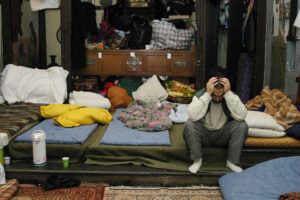
Over the past ten years, the number of refugees has doubled. Millions of people worldwide have been forced to leave their homes or even their countries.
After more than a decade of destruction and war in Syria, there are now more than 13.5 million Syrians – about half of the country’s entire population – who were forced to flee the country or at least to internally relocate. With 11.1 million people in desperate need of humanitarian assistance and at least half of them children, this is one of the worst humanitarian crises of the 21st century. (Source: World Vision). The economic impact of the war has driven the Syrian population into poverty and left people in desperate need for help.
In 2015, about 1.3 million people, mostly Syrians, came to Europe to request asylum, the most in a single year since World War II. It was a period of significantly increased movement of refugees in Europe and has led to serious conflicting views in the member states of the European Union. Refugee quotas were proposed and discussed while the most affected countries, like Greece or Italy have seen their most marginal territories assaulted by endless waves of migrants. Tragedies have happened, accidents have occurred… The image of a young boy found lying face-down on a beach near the Turkish resort of Bodrum made headlines worldwide in 2015 and has certainly sensitized the entire world. Germany, in an unprecedented move, officially opened its border to more than a million refugees.
Angela Merkel’s famous words ‘We can do it!’ were met with reluctance in the country, but Germans tried to work things out and find sustainable solutions to integrate these people into their society and work force. Other countries in Europe, like North Macedonia, Hungary, Serbia, or Montenegro, were more reluctant to welcome them. Turkey hosts the largest number of refugees in Europe, with Syrians representing the vast majority of them (officially, 3.6 million are Syrian). Refugees are mothers, fathers, sisters, brothers, children, with the same hopes and ambitions as us, except that a twist of fate has bound their lives to a global refugee crisis on an unprecedented scale.’ (Khaled Hosseini).
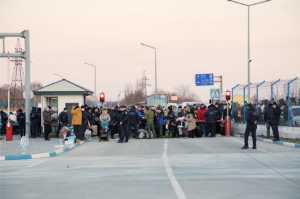
© Government of the Republic of Moldova
Yemen is another example of humanitarian disaster. After more than seven years of an internal violent conflict, about 66% of Yemen’s citizens (20 million Yemenis) are now entirely dependent on international assistance. 4.3 million people are currently internally displaced, living in terrible conditions and being constantly exposed to eviction and starvation. Afghanistan, (where one in ten people fled to neighbouring countries like Pakistan and Iran), Democratic Republic of Congo, Somalia, Myanmar, with its minority Rohingya community , South Sudan, the largest refugees crisis on the African continent (2.6 million) or Eritrea, where 10% of the population is currently living as refugees.
These are some of the regions where urgent and constant support is needed. Venezuela has also seen about 3.6 million people fleeing the country in recent years, trying to escape poverty and look for a better life elsewhere. The distribution of refugees is terribly unbalanced with developing countries hosting 86% of the world’s refugees and Venezuelans displaced abroad. The Least Developed Countries provide asylum to 27% of them. February 2022 brought another part of the world to attention. It had happened 80 years ago on the European continent, but this time, it was totally unexpected. It is a sad premiere, as it is officially the worst refugee crisis in Europe since the 1940s. When Ukraine, a country with a total population of 44 million, making it the second largest in Europe, was attacked by Russia, people fled over the borders, to the neighboring countries.
Millions have headed west, mainly to Poland, but also to the other countries such as the Republic of Moldova, Romania, Slovakia or Hungary. More than 450.000 people transited the small country of Moldova, with its 2, 7 million residents. About 100.000 Ukrainian refugees decided to stay, making Moldova currently the country with the most refugees per capita in the world.
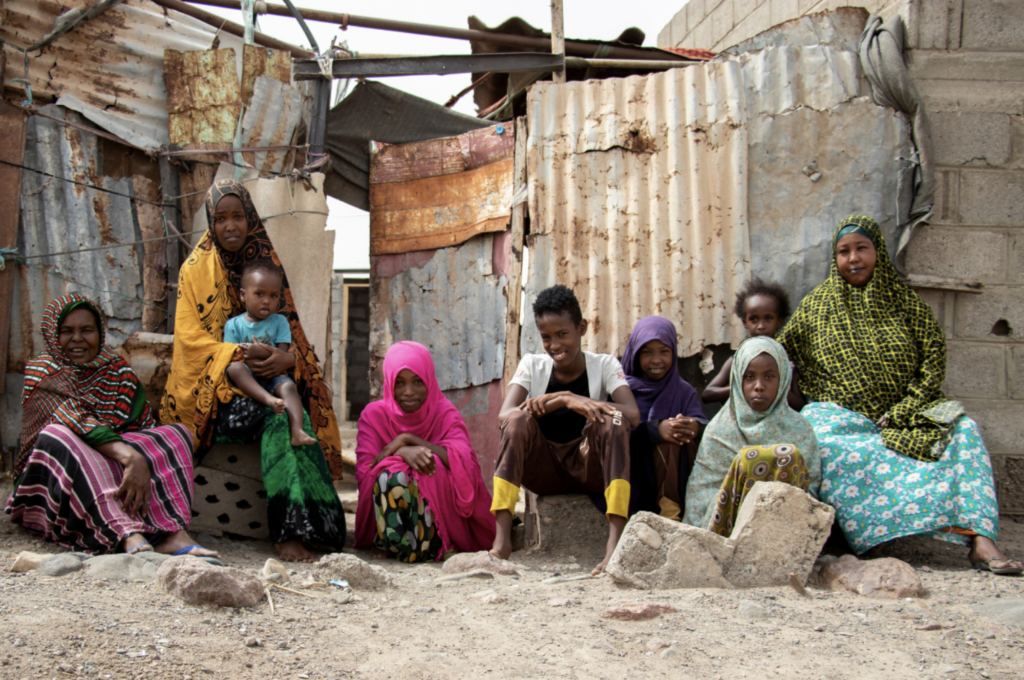
Because of this unexpected development, 2022 has seen the highest number of refugees worldwide. For the first time in history, the total number of displaced individuals (including refugees) has reached a staggering 100 million. The United Nations International Organization for Migration (IOM) declared at the beginning of May 2022 that more than 8 million people were internally displaced in Ukraine (mainly fleeing the most attacked regions of Kharkiv, Donetsk and Kyiv) and another 7 million (mainly women and children) have been recorded leaving Ukraine. More than a million have sought asylum in Poland, others in Moldova, Romania or Slovakia. Germany is also one of the main European destinations for the Ukrainian refugees.
With much of its infrastructure partially or entirely damaged, Ukraine has seen in recent months its biggest human exodus. Because of the scale of this disaster, a regional Refugee Response Plan has been initiated. UN and NGOs are focusing on supporting the affected persons and provide humanitarian aid as logistical support.
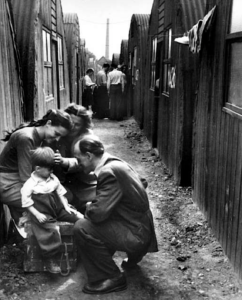
© UNHCR/1953
The United Nations Refugee Agency (UNHCR) is a UN agency meant to help and protect refugees, displaced communities and stateless people, and also to assist in their voluntary repatriation, local integration or resettlement to another country. UNHCR has been one of the main actors involved in protecting the people in need from the very beginning. It is a non-profit global organization initially created in 1950 to support the millions of displaced Europeans, after World War II and had a mandate of only 3 years at first. Just two years after receiving the Nobel Peace Prize for its work, in 1954, when 200,000 Hungarians had fled to Austria in order to escape persecution in their country, the organization stepped in and helped with their resettlement.UNHCR response to numerous crisis on the African continent or in Asia and Latin America have also shaped the way other NGOs deal with refugees, setting standards and earning another Nobel Prize for Peace, in 1981. The organization gradually expanded and today, more than 80 years later, it works in 135 countries with around 18,000 employees, helping millions.
More than 20 million refugees are currently under UNHCR protection. ‘This must serve as a wake-up call for more action to promote peace and address all causes of forced displacement’ said Filippo Grandi, the 11th United Nations High Commissioner for Refugees. He also added that 100 million displaced people ‘is a record that should never have been set’. Indeed, the total number of displaced people equals now the population of a large country like Vietnam, or about 1% of the world population! Funded mostly by voluntary contributions from governments and the European Union, the UNHCR was launched in 1950 with a small budget of just 300,000 USD. However, because of its increased needs, the annual budget reached 9.15 billion USD in 2021. From the smallest items to heavy duty vehicles, the agency’s work involves high-level and constant logistic and organizational efforts. It also follows the 1951 Refugee Convention rules and the 1967 Protocol, both core documents for the UNHCR. One of the main principles of the Refugee Convention (signed by 149 states) is ‘the principle of nonrefoulement’, meaning that refugees should not be returned against their will to the countries of origin, where they could face threats to their life or freedom. On their website, it is clearly stated that t h e UNHCR ‘serves as a guardian of the 1951 Convention and its 1967 Protocol’ .
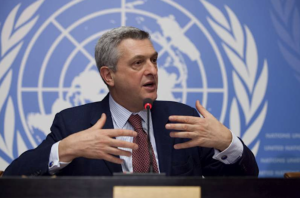
The UNHCR is present in the most affected areas and in the refugee camps. For instance, in Poland which remains the main country of arrival for Ukrainian refugees, (more than 3.5 million crossed the border since February 24), even though the pace of arrivals has slowed down lately. There are still around 20,000 daily border crossings, with also more
“pendular” movements, as people go back and forth across the border to Ukraine. As the war is still raging, UNHCR expects more Ukrainian refugees to go to Poland and other neighbouring countries.
From the 1.1 million who have registered with the Polish authorities, 94 % are women and children. For them, the UNHCR initiated a threemonth cash assistance programme, established in eight main areas hosting refugees, including Warsaw, Krakow, Poznan, Wroclaw, Ostroda, Gdynia and Gdansk. Over 100,000 refugees from Ukraine have already received financial support from the UNHCR, covering basic needs (rent, food and medicine).InSudan,t h e UNHCR is working together with local authorities and partners to provide emergency shelter, food, hygiene essential products and clean water to the many refugees coming from the Tigray region in Ethiopia. Last years, there were also information campaigns on COVID-19 prevention, with the distribution of soap and 50,000 face masks at border points. the UNHCR also helps with the registration of new arrivals from Ethiopia.
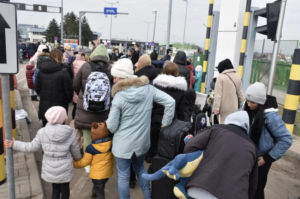
In Nigeria, the Boko Haram insurgency has displaced nearly 2.4 million people. Although there have been improvements lately, civilians in Nigeria, Cameroon, Niger and Chad are still affected by human rights violations, violence and forced recruitment. So, the UNHCR is present with its local office, and safeguards the welfare of millions. By the end of 2019, Greece was hosting over 186,000 refugees and asylumseekers from countries like concentrated on the protection of these people, the country being one of UNHCR’s largest operations in 2019 on the European continent. Last year, the Greek government took over the running of all refugee camps and the EU-funded cash assistance program, which was formerly run by the UN.
With its almost 5 million refugees, Turkey has been the largest refugee hosting country in the world for the past several years. The financial requirements for supporting this vast number of people are huge. Turkey has repeatedly demanded increased funding from the EU in order to protect refugees and stop them from going further into Europe. According to the UNHCR, their own funding for required regular programmes and the Syria Situation Response in Turkey is around 349 million USD in 2022. The presence of refugees in Turkey has caused tensions with locals, especially now, as the country is in economic turmoil. But president Recep Tayyip Erdogan declared that “we will never expel refugees from this land. Our door is wide open to them”.
Worldwide, Lebanon is a country where nearly a quarter of its total population are refugees. Around 1.5 million people are currently displaced there as a result of the civil war in Syria. Refugees began entering Lebanon in large numbers since 2011 and sadly, 90% of these Syrian refugees are now living in extreme poverty. The UNHCR with its local office supports both Lebanese communities and refugees, coordinating the protection response, together with the Lebanese Government, other UN agencies and partners, through the Lebanon Crisis Response Plan.
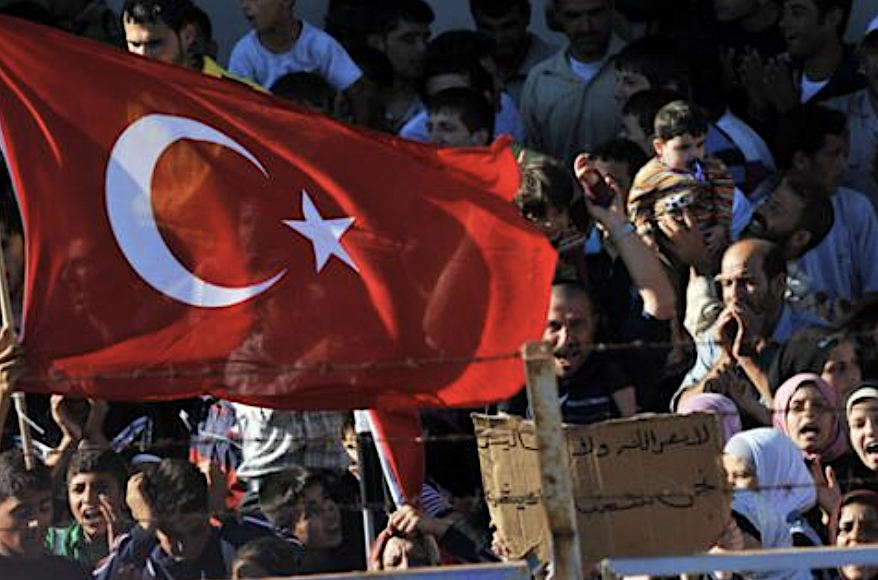
Over the years, the UNHCR has wisely associated its name to prominent international figures, leading to an increased popularity and attracting more donations and contributions. Famous American actress, Angelina Jolie, is now a Special Envoy for UNHCR, actress Cate Blanchett, supermodel Alek Wek, designer Giorgio Armani or footballer Alphonso Davies (himself a former refugee, born in a refugee camp in Ghana) are just a few examples of Goodwill Ambassadors of the organization. They all give part of their time and energy and use their names to support the refugee cause.
Luciano Pavarotti, the magnificent Italian tenor who initiated the grandiose, annual concerts ‘Pavarotti and Friends’ and raised money for UNHCR projects in Kosovo, was named United Nations Messenger of Peace in 1998, and awarded the UNHCR Nansen Refugee Award in 2001 for his generous and continuous contribution.
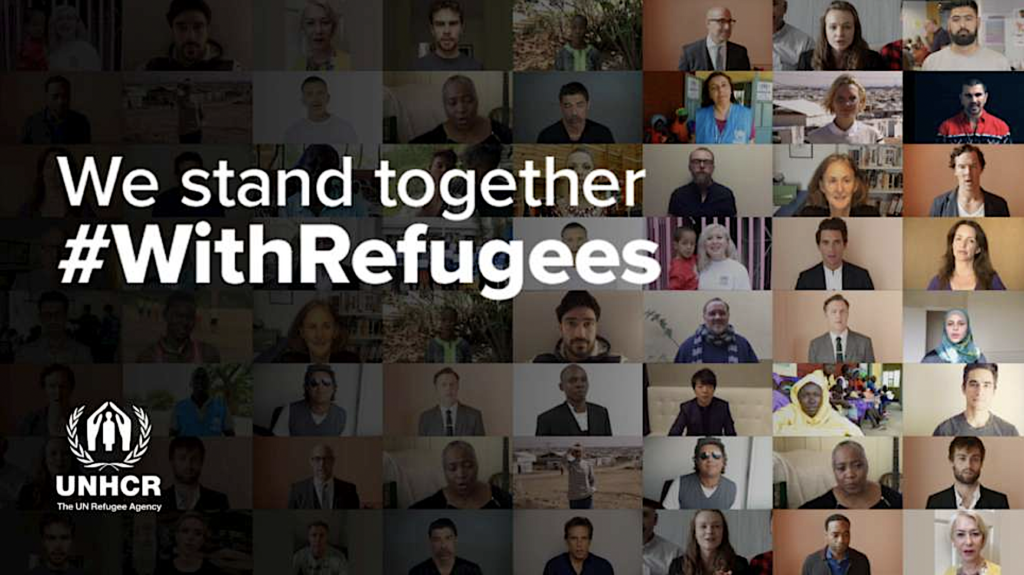
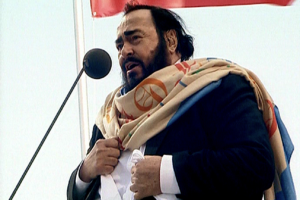
The UNHCR Nansen Refugee Award is given each year since 1954, to a person or organization, as an official recognition of exceptional commitment to supporting refugees, displaced or stateless people. The latest laureate of this medal is the humanitarian organization Jeel Albena Association for Humanitarian Development (JAAHD), as recognition to their service for displaced people in Yemen. The association managed to help more than 60,000 people and built 18,000 shelters for the needy, despite the dangerous and difficult on-site conditions. The UNHCR and the social media platform Tik Tok have recently launched a hashtag challenge and a live concert series. #TheWorldNeeds is a campaign of solidarity with refugees, trying to use music to bring people closer together for this cause.
This unique humanitarian campaign encourages artists to spread the message of global support for refugees and calls for safe and legal access to asylum. The famous song ‘What the world needs now’ by Dionne Warwick has been chosen as a centerpiece of the online challenge. Tik Tok has opened a dedicated information page where people can find out about ways to support and donate for refugees. All donations will help the UNHCR to fund some critical and urgent humanitarian programs. As the agency’s Director of External Relations, Dominique Hyde suggested, “UNHCR needs more partners like Tik Tok, to bring a wareness to those who need it most’”. In 2022, the Oscar awards ceremony, with its 1 billion audience worldwide was a display of support for refugees and the perfect opportunity to spread awareness.
Lots of A-class movie stars wore blue ribbons with the sign #withrefugees and used the occasion to affirm their solidarity with refugees around the globe. Also, five of this year’s nominated movies directly addressed themes of displacement and were refugee-related. UNHCR twitted on Oscar night “Five Oscar- nominated films tell the stories of conflict, displacement and the remarkable strength of the human spirit”. People have to be aware of the global refugee situation and need to show empathy and solidarity with others in need.
“It is the obligation of every person born in a safer room to open the door when someone in danger knocks. Giving refuge should be thought of as an act of compassion rather than a gift’” (Dina Nayeri, Iranian novelist and former refugee).

